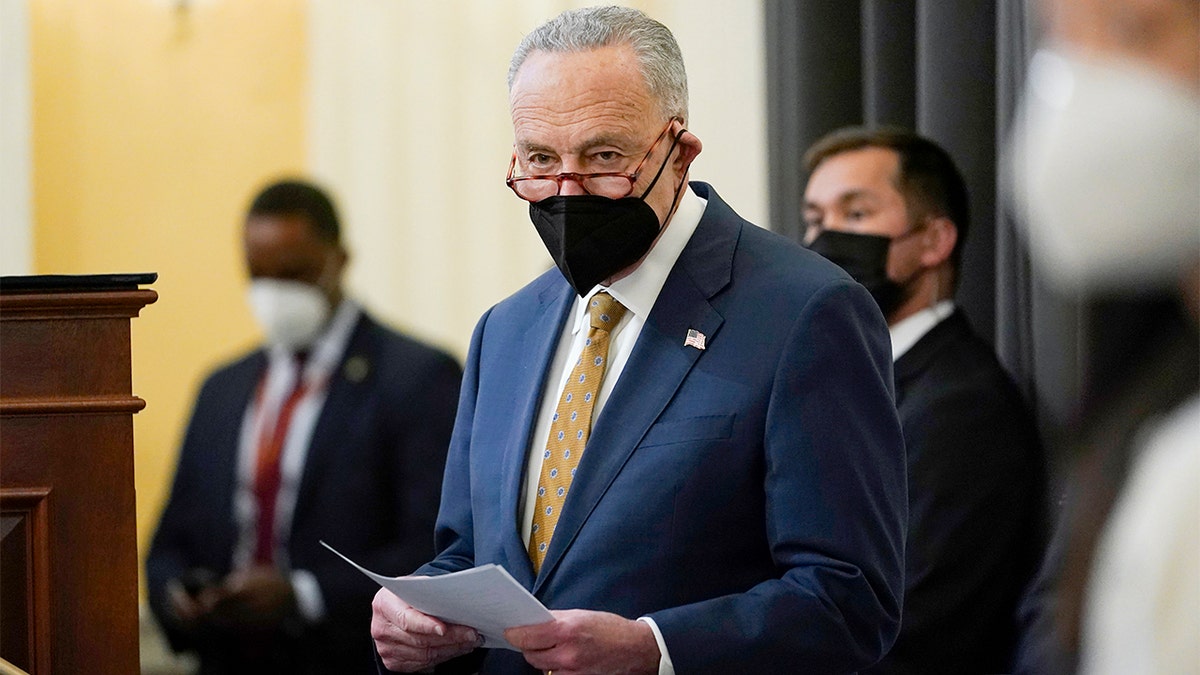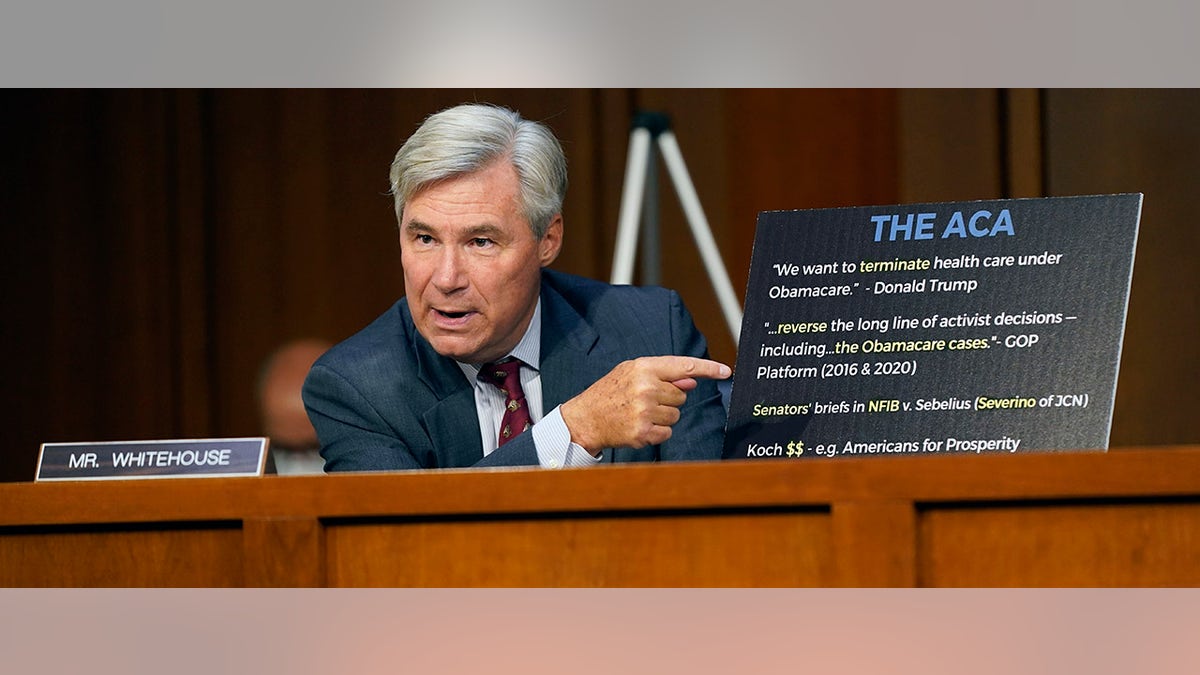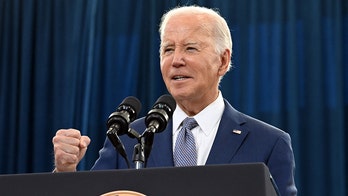Fox News Flash top headlines for February 21
Fox News Flash top headlines are here. Check out what's clicking on Foxnews.com.
Some of the top Democrat senators expected to be involved in advancing President Biden's Supreme Court nominee – who Biden promised would be a Black woman – voted against the vast majority of former President Donald Trump's appeals court nominees who were not white men.
According to an analysis from the right-leaning Article III Project, Senate Majority Leader Chuck Schumer, D-N.Y., voted against 95% of minority appeals court nominees from Trump.
Senate Judiciary Committee Chairman Dick Durbin, D-Ill., meanwhile, voted against 81% of such nominees, according to the analysis. And Sen. Sheldon Whitehouse, D-R.I., one of the most vocal members of the Judiciary Committee, voted against 71% of Trump's minority appeals court nominees.
The analysis by the Article III Project also identifies dozens of other minority federal court nominees from Trump and former President George W. Bush that at least one the three senators opposed.

Senate Majority Leader Chuck Schumer of N.Y., waits to speak during an event to mark one year since the U.S. Capitol insurrection on Capitol Hill in Washington, Jan. 6, 2022. (AP Photo/Susan Walsh, Pool) (AP Photo/Susan Walsh, Pool)
"Democrats talk a big game on diversity in the courts and about how representation matters, but their records don’t match their rhetoric," Article III Project founder and president Mike Davis said of the analysis, first shared with Fox News. "These Democrats are quick to weaponize race and gender to achieve their progressive political goals, but diversity in the workplace, racial progress, and gender equality clearly aren’t their real priorities."
WHAT IS A SUPREME COURT ‘SHERPA?’
Davis added: "As Democrats prepare to nominate a Black woman to the Supreme Court, remember how they treated Clarence Thomas, Janice Rogers Brown, Miguel Estrada, and Amy Coney Barrett during their confirmation processes."
Democrats, of course, did not just vote against Trump's minority appeals court nominees. They erected roadblocks and voted against Trump's picks for federal district and appeals courts – no matter what race or gender – at a clip much higher than even what Republicans did under former President Barack Obama.

Sen. Dick Durbin, D-Ill., speaks before the Senate Judiciary Committee on the fourth day of hearing on Supreme Court nominee Amy Coney Barrett, Thursday, Oct. 15, 2020, on Capitol Hill in Washington. (AP Photo/Susan Walsh, Pool) (AP Photo/Susan Walsh, Pool)
Democrats said they voted against these nominees based on their qualifications or their ideology.
BIDEN SAYS HE'LL NOMINATE A BLACK WOMAN TO SUPREME COURT BY END OF FEBRUARY
Whitehouse asked Judge Jason Kenneth Pulliam, a Black man, a series of tough questions on his beliefs about abortion and same-sex marriage in written questions for the record during his confirmation. Whitehouse, Schumer, and Durbin all voted against Pulliam's confirmation to a Texas-based federal district court.
All three also voted against Judge Patrick Bumatay when he was nominated to the 9th Circuit Court of Appeals. Bumatay is Asian-American and gay. Then-ranking member of the Senate Judiciary Committee Sen. Dianne Feinstein, D-Calif., said she did not think Bumatay had the experience to sit on an appeals court.
"Mr. Bumatay has only argued twice before any appellate court, state or federal, furthermore he identified only 10 appellate briefs, motions or other filings that he has submitted in his legal career," she said. "Notably three of those filings had occurred after the White House interviewed Mr. Bumatay in connection to his present nomination to the Ninth Circuit."
The Article III Project analysis comes as Democrats are attacking some Republicans who criticized Biden's promise to nominate a Black woman and as the White House has already implied racism may be a factor in GOP opposition to a Biden nominee.

Sen. Sheldon Whitehouse, D-R.I., speaks during the confirmation hearing for Supreme Court nominee Amy Coney Barrett before the Senate Judiciary Committee, Tuesday, Oct. 13, 2020, on Capitol Hill in Washington. (AP Photo/Patrick Semansky)
"The president’s view is that anyone who’s saying that that’s not possible or we can’t find the most eminently qualified person [by selecting a Black woman] — that’s ludicrous," White House Press Secretary Jen Psaki said last month.
"I mean, that’s suggesting that a Black woman should not be a part of the most important court in our nation, that there aren’t Black women who have distinguished themselves by rising to the top of the legal profession with the strongest credentials imaginable," she added.
CLICK HERE TO GET THE FOX NEWS APP
Democrats also say that even though Trump appointed some high-profile minority nominees, including selecting the first woman with school aged children for the Supreme Court, a disproportionate number of his picks were white men.
Biden is expected to announce his Supreme Court pick this week – or next Monday at the very latest – after he said his plan was to choose his nominee by the end of this month.
Among the most discussed candidates are South Carolina District Court Judge J. Michelle Childs, D.C. Circuit Court Judge Ketanji Brown Jackson, California Supreme Court Justice Leondra Kruger, and NAACP Legal Defense Fund president Sherrilyn Ifill.






